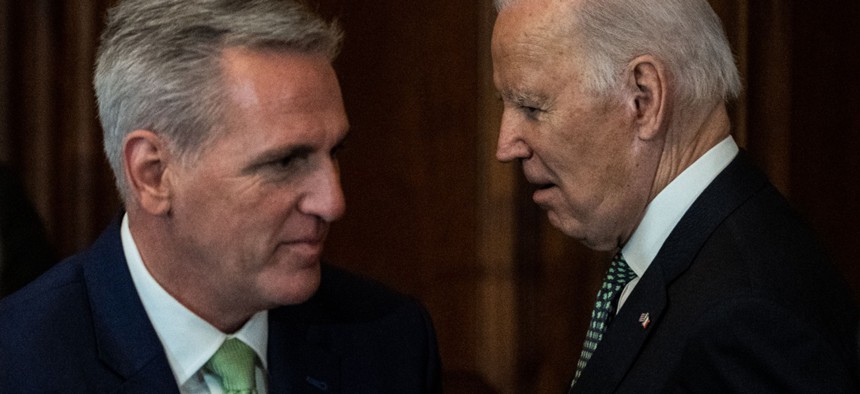
President Biden (right), walks past House Speaker Kevin McCarthy, R-Calif., after delivering remarks at the annual Friends of Ireland Caucus St. Patrick's Day Luncheon in the Rayburn Room of the U.S. Capitol on March 17. McCarthy said it is time for the two to roll up their sleeves and get to work on debt ceiling negotiations. Kent Nishimura / Los Angeles Times via Getty Images
McCarthy Wants Biden 'On the Clock' to Negotiate Over the Debt Ceiling
The House speaker says he wants to avoid brinksmanship, but is refusing the White House's request for a clean debt limit increase and calling for dramatic spending cuts.
This story was updated with additional comment at 5:30 p.m.
President Biden must negotiate over “out-of-control government spending” to avoid a debt ceiling breach that would likely have catastrophic consequences, the top congressional Republican said on Tuesday, ramping up pressure for talks as the government hurtles toward a deadline likely to occur this summer.
A key to advancing those talks will be slashing funding for non-defense agencies to “pre-inflationary levels,” House Speaker Kevin McCarthy, R-Calif., said in a letter to Biden. McCarthy also called for spending caps for non-defense agencies beyond fiscal 2024. To date, Biden has said he will not attach any efforts to reduce the national debt to debt ceiling negotiations.
McCarthy’s letter included a list of demands for raising the debt ceiling, which Congress will likely address by mid-August to avoid a default. In addition to discretionary spending cuts, McCarthy suggested lawmakers and the White House could lower deficits by reclaiming unspent COVID-19 relief funds, instituting additional work requirements for recipients of federal assistance and lowering energy costs.
While Biden has repeatedly said Republicans have threatened a default by refusing to pass a “clean” suspension or increase of the debt limit, McCarthy attempted to redirect the blame.
“With each passing day, I am incredibly concerned that you are putting an already fragile economy in jeopardy by insisting upon your extreme position of refusing to negotiate any meaningful changes to out-of-control government spending alongside an increase of the debt limit,” McCarthy said. “Your position—if maintained—could prevent America from meeting its obligations and hold dire ramifications for the entire nation.”
While economists and lawmakers have speculated about a range of outcomes if an unprecedented default were to occur, most have agreed the most likely scenario would require the Treasury Department to delay all government payments until it had enough money available to meet the demands of a given day.
That would require federal employees to either face furloughs or work with only the promise of back pay once the situation was resolved. In another possibility, which experts have called politically and potentially legally untenable, Treasury would prioritize some payments while allowing others to go unpaid. In either scenario, agency payments to beneficiaries, states, grantees, contractors and, potentially, their own employees, would be disrupted.
Despite calling for negotiations in order to pass any debt ceiling legislation, McCarthy said he had “no interest in brinksmanship.”
White House Press Secretary Karine Jean-Pierre said in a statement Tuesday that Republicans should “stop playing games, pass a clean debt ceiling bill and quit threatening our economic recovery.” She added Biden would welcome a “separate conversation” about fiscal issues, but called for specifics from McCarthy and his colleagues.
Olivia Dalton, another White House spokesperson, said at a briefing Tuesday that Biden would discuss Republicans’ ideas once they deliver a plan.
“We've seen the letter but where's the budget?” Dalton said. She declined to say Biden would only or certainly meet with Republicans to discuss the looming crisis once they put out their spending blueprint, noting only that the White House wants to see the situation addressed quickly. “We want to see assurances that the House Republicans aren't going to hold the full faith and credit of the United States hostage.”
Republicans that make up the House Freedom Caucus have said McCarthy has agreed to cut non-defense spending to fiscal 2022 levels, which would require reductions of more than 20%. The Biden administration and congressional Democrats have repeatedly condemned that plan, saying it would be devastating for critical federal programs. Interior Secretary Deb Haaland, for example, told lawmakers on Tuesday that in such a scenario her agency would slash as many as 1,700 wildland firefighters and cut pay, eliminate 1,500 tribal personnel, process fewer permits and offer fewer services at national parks.
McCarthy told Biden his letter put the president “on the clock” and said the two sides should begin discussing when to meet next by the end of this week.
“It’s time to drop the partisanship, roll up our sleeves and find common ground on this urgent challenge,” the speaker said.
Senate Majority Leader Chuck Schumer, D-N.Y., said McCarthy’s letter failed to “advance the ball” because it contained no specific plan.
“If they were to sit down you’d have to ask yourself what are Speaker McCarthy and the president going to talk about, the weather?” Schumer said. “We have plan: to pass the debt ceiling without hostage taking, without brinksmanship and just get it done.”







